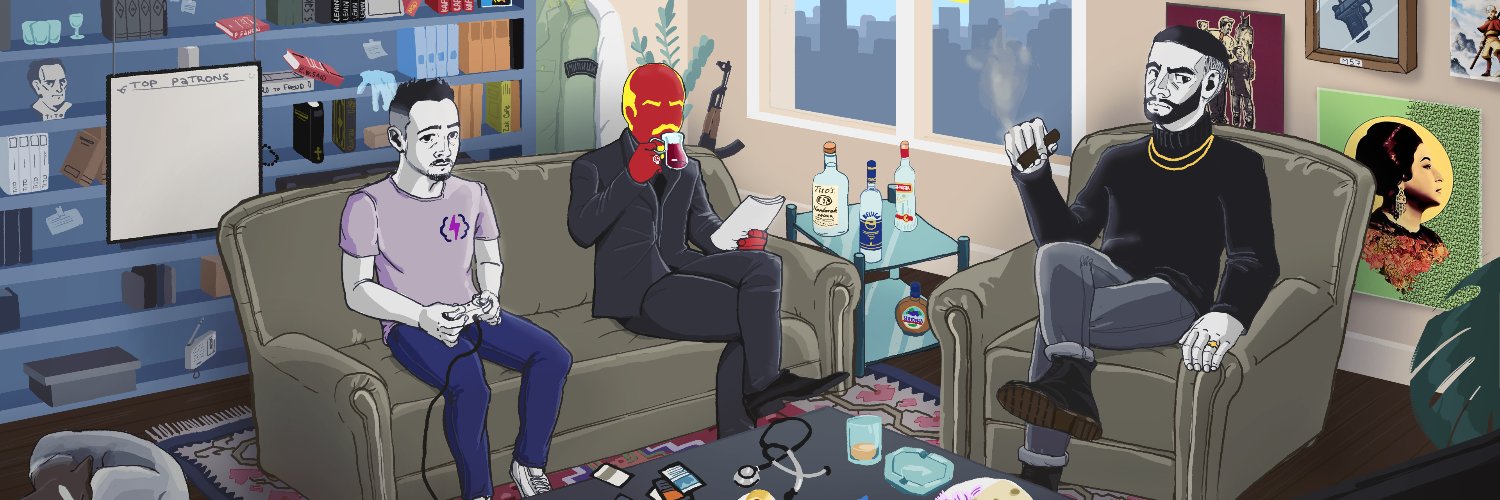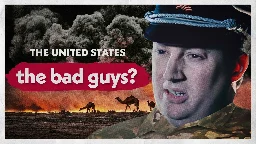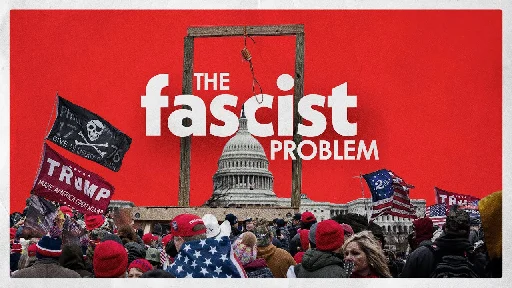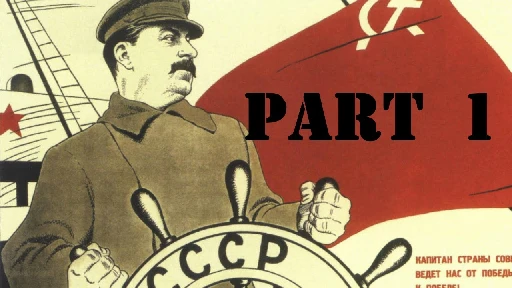
The Deprogram Podcast
- r/TheDeprogram Wiki Index
Wiki
%%last updated to match The Deprogram Wiki on 2024-01-03%%
> As revolutionaries, we don’t have the right to say we are tired of explaining. We must never stop explaining. We know that when the people understand, they cannot help but follow us. > > — Thomas Sankara
Education
These articles seek to explain various fundamental Communist concepts. However, these are often oversimplistic and sometimes reductive and they are no substitute for reading actual theory. Please see the Study Guide for details.
Primers:
Praxis
> Philosophers have hitherto only interpreted the world in various ways; the point is to change it. > > — Karl Marx. (1845). Theses On Feuerbach
Debunking
These articles aim to dispel common myths and misconceptions about a variety of topics.
USSR
PRC
Cuba
Logical Fallacies
Israel
Profiles
Dunking
Naming and Shaming
Ideological State Apparatuses (ISA)
- The deprogram server 😭

This is what you get when you constantly promote zizek.
Edit: there’s a reason why marxists don’t use hegel’s dialectics
- American Liberals Are The Most Dangerous Thing In The Western Hemisphere

YouTube Video
Click to view this content.
cross-posted from: https://lemmygrad.ml/post/3902148
> American Liberals Are The Most Dangerous Thing In The Western Hemisphere
- The Deprogram Episode 115 Ft. Ben Norton

YouTube Video
Click to view this content.
I haven't been listening regularly to the podcast in some time but this episode caught my attention because Ben Norton is such a great and knowledgeable commentator. As expected it was a really good one. I don't mind them having more fluff-filled lighter episodes, but those are just not for me. I much prefer serious substantive episodes like this. They have also occasionally had guests on that i thought were fairly disappointing, so i hope that they keep bringing guests of this caliber.
- Wake up, bae. New JT video just droppedm.youtube.com Are We The Baddies?
As uncomfortable as it may be to find flaws in your home country, wherever that may be, it's an important part of being an informed citizen. While it's good ...

- r/TheDeprogram Che Guevara
%%last updated to match The Deprogram Wiki on 2024-01-03%%
Ernesto "Che" Guevara
> If you are capable of trembling with indignation each time that an injustice is committed anywhere in the world, we are comrades. > > — Che Guevara. (1964). Quoted in Guerrillas in Power: The Course of the Cuban Revolution (1971) by K. S. Karol
Ernesto "Che" Guevara was an Argentine Marxist revolutionary, physician, author, guerrilla leader, diplomat, and military theorist.
As a young medical student, Guevara traveled throughout South America and was radicalized by the poverty, hunger, and disease he witnessed. His burgeoning desire to help overturn what he saw as the Capitalist exploitation of Latin America by the United States prompted his involvement in Guatemala's social reforms under President Jacobo Árbenz, whose eventual CIA-assisted overthrow at the behest of the United Fruit Company solidified Guevara's political ideology. Later in Mexico City, Guevara met Raúl and Fidel Castro, joined their 26th of July Movement, and sailed to [[r.TheDeprogram Cuba|Cuba]] aboard the yacht Granma with the intention of overthrowing U.S.-backed dictator Fulgencio Batista. Guevara soon rose to prominence among the insurgents, was promoted to second-in-command, and played a pivotal role in the two-year guerrilla campaign that deposed the Batista regime.
After the Cuban Revolution, Guevara played key roles in the new government. These included reviewing the appeals and firing squads for those convicted as war criminals during the revolutionary tribunals, instituting agrarian land reform as Minister of Industries, helping spearhead a successful nationwide literacy campaign, serving as both President of the National Bank and instructional director for Cuba's armed forces, and traversing the globe as a diplomat on behalf of Cuban Socialism. Such positions also allowed him to play a central role in training the militia forces who repelled the Bay of Pigs Invasion. Additionally, Guevara was a prolific writer and diarist, composing a seminal guerrilla warfare manual, along with a best-selling memoir about his youthful continental motorcycle journey. His experiences and studying of Marxism–Leninism led him to posit that the Third World's underdevelopment and dependence was an intrinsic result of imperialism, neocolonialism, and monopoly capitalism, with the only remedies being proletarian internationalism and world revolution.
Guevara left Cuba in 1965 to foment continental revolutions across both Africa and South America, first unsuccessfully in Congo-Kinshasa and later in Bolivia, where he was captured by CIA-assisted Bolivian forces and summarily executed.
Additional Resources
You can find his writings in the Marxist Internet Archive: https://www.marxists.org/archive/guevara/index.htm
Video Essays:
- Who Did Che Guevara Murder? | BadEmpanada (2019)
- Che Guevara: Homophobic Racist? Response to Steven Crowder & PragerU | BadEmpanada (2019)
- Che Guevara's True Legacy | BadEmpanada (2020)
- Conservatives Love Lying About Che Guevara, Inventing Fake Quotes | BadEmpanada (2020)
- Cuba and Che Guevara TALKING POINTS by Sky News - How Do They Hold Up? | BadEmpanada (2021)
- Che Guevara: Revolutionary Hero | Che's Life, Legacy, and Theory | Marxism Today (2022)
Books, Articles, or Essays:
- Che Guevara: A Revolutionary Life | Jon Lee Anderson (1997)
Podcasts:
- In Defense of Che Guevara: Analyzing his Life and Answering his Critics | Revolutionary Left Radio (2017)
- r/TheDeprogram Cuba
%%last updated to match The Deprogram Wiki on 2024-01-03%%
Cuba
The Cuban Revolution, led by Fidel Castro and Ernesto "Che" Guevara, was a Communist revolution which aimed to address issues of inequality, poverty, and national self-determination. Under Castro's leadership, the Cuban government nationalized industries, implemented land reforms, and initiated programs to improve healthcare and education access.
Brief History
Slavery was introduced to Cuba by the Spanish during the early 16th century. African slaves were brought to the island to work on sugar plantations, which became the backbone of the Cuban economy. The brutal conditions of slavery led to various slave rebellions and uprisings throughout the colonial period.
In 1898, the Spanish-American War resulted in Spain ceding control of Cuba to the United States.
The majority of workers in Cuban sugar plantations during this period were either former slaves or descendants of enslaved Africans. Despite the official abolition of slavery in 1886, workers faced extreme economic exploitation. They were trapped in a cycle of poverty, with low wages and limited opportunities for social and economic mobility. The patronato system emerged, where former slaves and their descendants continued to work on the plantations under debt peonage, a form of economic bondage.
In 1952, Fulgencio Batista seized power in a military coup, suspending the Cuban Constitution and ruling as a dictator. Batista's regime was backed by influential Cuban elites, including large landowners, sugar magnates, and business tycoons who benefited from Batista's policies. The U.S. provided military aid and economic support to Batista's military dictatorship.
> ...as Castro's revolutionary threat became progressively more potent... the Batista regime sought to counter it with a campaign of terror. As regime-inspired terrorism mounted, anti-Batista groups engaged in counter terrorism against regime supporters and by mid-1958 killings had become widespread and general throughout the country. The regime's campaign of terror got out of control and the government in Havana probably had no clear idea of how many killings the police and army forces were committing. Similarly, the anti-Batista forces--which by mid-1958 had the support of 80 to 90 percent of the population-- had little control over the acts of counterterrorism being committed against pro-Batista elements throughout the country. > > ...the large-scale campaigns of murders and terrorism characteristic of the last years of the Batista regime have not occurred during the Castro regime. > > — CIA. (1965, declassified 2005). Political Murders in Cuba: Batista Era Compared With Castro Regime
The Embargo
> The majority of Cubans support Castro... The only foreseeable means of alienating internal support is through disenchantment and disaffection based on economic dissatisfaction and hardship... it follows that every possible means should be undertaken promptly to weaken the economic life of Cuba. If such a policy is adopted, it should be the result of a positive decision which would call forth a line of action which, while as adroit and inconspicuous as possible, makes the greatest inroads in denying money and supplies to Cuba, to decrease monetary and real wages, to bring about hunger, desperation and overthrow of government. > > — Lester D. Mallory. (1960). 499. Memorandum From the Deputy Assistant Secretary of State for Inter-American Affairs (Mallory) to the Assistant Secretary of State for Inter-American Affairs (Rubottom)
Later that year, the Eisenhower administration instituted the embargo which persists to this day, over 60 years later.
> The non-binding resolution [calling for an end to the U.S. economic embargo on Cuba] was approved by 185 countries and opposed only by the United States and Israel... It was the 30th time the United Nations has voted to end the embargo... The trade embargo was put in place following Fidel Castro's 1959 revolution and has remained largely unchanged, though some elements were stiffened by Trump. > > — Reuters. (2022). Cuba and U.S. spar over U.N. resolution calling to end embargo
- The U.S. Embargo on Cuba Is MUCH WORSE Than It Seems | BadEmpanada (2021)
- The Cuban Embargo Explained | azureScapegoat (2022)
Castro Stole My Stuff
> The US claims that it has instituted a policy of tightening the economic noose around Cuba with the Helms-Burton bill on the grounds that Cuba refuses to compensate US companies following nationalisation of their property. This is patently untrue, as Cuba not only successfully negotiated compensation agreements with other countries, but has and is ready to negotiate with the US. > > — S. J. Noumoff. (1998). The Hypocrisy of Helms-Burton: The History of Cuban Compensation
- The Cuban Nationalization of US Property in 1960: the Historical and Global Context | Charles McKelvey (2019)
Doctors
Despite the challenges posed by the embargo, Cuba has the most doctors per capita in the world and recently surpassed the US in life expectancy.
- The Truth About Cuban Doctors | BadEmpanada (2020)
- [[Meet the U.S. Students Studying Medicine For Free in Cuba - YouTube]] | BreakThrough News (2022)
Democracy
- [[How Democracy Works in Cuba - YouTube]] | azureScapegoat (2018)
- [[How does Cuba work - YouTube - Viki1999]] | Viki1999 (2021)
- We Asked Cuban Voters If They Live In A Democracy Or Dictatorship. Here's How They Responded. | BreakThrough News (2022)
Participatory Democracy in action: LGBT rights
Prior to the revolution, homosexuality was stigmatized and criminalized in Cuba, reflecting the prevailing attitudes of the time. Unfortunately, the revolutionary government under Fidel Castro initially continued this stance. However, Cuba's stance on LGBT rights has evolved to the point where it has become a symbol of progress within the Latin American context. In 2010, Fidel Castro himself admitted that the persecution of homosexuals in the early years of the revolution was a mistake:
> If anyone is responsible, it's me. > > — Fidel Castro. (2010). I am responsible for the persecution of homosexuals that took place in Cuba: Fidel Castro
In 2022, Cuba became the first Latin American country to mark LGBT History Month. Now, Pride parades in Havana are held every May, to coincide with the International Day Against Homophobia, Biphobia and Transphobia, and attendance grows every year. Cuba also passed one of the most progressive Family Codes in the entire world:
> The Family Code not only protects the most vulnerable in Cuba, it protects the course of Cuban socialism. Writing the referendum involved the whole population throughout the processes of drafting and amending. It went through 25 revisions over the course of 3 ½ years. > > After the referendum was introduced in 2019, Cuba carried out a nationwide process of education and outreach. Discussions took place in every workplace, organization, neighborhood and community group. To keep all Cubans well-informed, people took the discussions to rural areas and to those who do not have internet access. > > The Family Code was approved by Cubans 2 to 1. A large percentage of Cubans, 74%, took part in the vote... > > In Workers World Sept. 25, 2022, Minnie Bruce Pratt wrote, “Nearly 6.5 million Cubans took part in more than 79,000 meetings facilitated by the Federation of Cuban Women, the Committees to Defend the Revolution and other community organizations. Over 400,000 proposals were offered by the people; these were submitted to the National Assembly of People’s Power for evaluation, and a revised draft was returned to the people for further discussion and proposals... > > Cubans are very proud of what they call participatory democracy, the process they used to introduce and pass the referendum. It is an example to the world and a lesson in democratic centralism. > > — Lyn Neeley. (2023). Cuba’s new Family Code, a law of love
- Millions of Cubans Vote on New Family Code, LGBT Marriage, Adoption Rights & More | BreakThrough News (2022)
Additional Resources
Video Essays:
- Cuba: Before and After the Revolution - The Story of When Michael Parenti Visited Cuba | azureScapegoat (2017)
- The Truth About The Cuban Missile Crisis | Spooky Scary Socialist (2018)
- How Cuba Works | BadEmpanada (2020)
- The Truth About The Cuba Protests | Second Thought (2020)
- Why They Hate The USA: CUBA | Hakim (2023)
Podcasts:
- Fidel Castro and the Cuban Revolution | Revolutionary Left Radio (2017)
- Season 2 - The Cuban Revolution | Blowback (2021)
- Episode 13 - Cucked by Fidel (CIA pls no assassinate) | The Deprogram (2022)
- I'm super surprised Tom Nicholas was invited
From what I saw he's a "Orwell is a great socialist author" and "the USSR was fascist" kind of terminally white bourgeois British dude. Did he, like, watched a Hakim or JT video before accepting?? I hope it's because he's having a redemption arc or something
- JT is doing an AMA on Hexbear!
cross-posted from: https://hexbear.net/post/712631
> JT will be answering questions below, due to a scheduled appointment that couldn't be changed he will be starting a little late, answers will begin roughly 1 hour after the post starts. > > Like usual there are no strict time limits set for this so JT will come and go as and when his time allows, if he doesn't get to your questions be patient! This post will be edited here when things end. > > JT's posting account for AMAs is: @Secondthought_JT . > > Be sure to check out The Deprogram if you haven't already! Available wherever you listen to podcasts. > > *** > > The Deprogram | Second Thought | First Thought > > The Deprogram on Twitter | JT on Twitter > > The Deprogram subreddit
- r/TheDeprogram The Information Research Department (IRD)
%%last updated to match The Deprogram Wiki on 2023-08-13%%
The Information Research Department (IRD)
The Wikipedia article for this organization is damning enough:
> The IRD was a secret Cold War propaganda department of the British Foreign Office, created to publish anti-communist propaganda, including black propaganda, provide support and information to anti-communist politicians, academics, and writers, and to use weaponised information, but also disinformation and "fake news" to attack not only its original targets but also certain socialists and anti-colonial movements. Soon after its creation, the IRD broke away from focusing solely on Soviet matters and began to publish pro-colonial propaganda intended to suppress pro-independence revolutions in Asia, Africa, Ireland, and the Middle East. The IRD was heavily involved in the publishing of books, newspapers, leaflets, journals, and even created publishing houses to act as propaganda fronts, such as Ampersand Limited. Operating for 29 years, the IRD is known as the longest-running covert government propaganda department in British history, the largest branch of the Foreign Office, and the first major anglophone propaganda offensive against the USSR since the end of World War II. By the 1970s, the IRD was performing military intelligence tasks for the British Military in Northern Ireland during The Troubles. > > The IRD was the government department to which George Orwell submitted his list of suspected Communists (Orwell's list), including many prominent people such as Charlie Chaplin, Paul Robeson, and Michael Redgrave. With the help of Orwell's widow Sonia Orwell and his former publisher Fredric Warburg, the IRD gained the foreign rights to much of Orwell's work and spent years distributing Animal Farm onto every continent, translating Orwell's works into 20 different languages, funding the creation of an animated feature film based on Animal Farm, and working with the CIA to create the feature-length Animal Farm animated movie, the first of its kind in British history. Many historians have noted how Orwell's literary reputation can largely be credited to joint propaganda operations between the IRD and CIA. The IRD heavily marketed Animal Farm for audiences in the middle-east in an attempt to sway Arab nationalism and independence activists from seeking Soviet aid, as it was believed by IRD agents that a story featuring pigs as the villains would appeal highly towards Muslim audiences. The IRD funded the activities of many authors including Arthur Koestler, Bertrand Russell, and Robert Conquest. > > Internationally, IRD agents took part in many historic events, including Britain's entry into the European Economic Community, the Korean War, the Suez Crisis, the Malayan Emergency, The Troubles, the Mau Mau Uprising, Cyprus Emergency, and the Sino-Indian War. Other IRD activities included forging letters and posters, conducting smear attacks against British trade unionists, and attacking opponents of the British military by planting fake news stories in the British press. Some of these fabricated stories the IRD created included accusations that Irish republicans were killing dogs by setting them on fire, and falsely accusing EOKA members of raping schoolgirls. > > Although the existence of the IRD was successfully kept hidden from the British public until the 1970s, the Soviet Union had always been aware of its existence, for Guy Burgess had been posted to IRD for a period of two months in 1948. Burgess was later sacked by the IRD's founder Christopher Mayhew, who accused him of being "dirty, drunk and idle". The IRD closed its operations in 1977 after its existence was discovered by British journalists after an investigation into a heavy amount of anti-Soviet propaganda being published by academics belonging to St Antony's College, Oxford. An exposé published in The Guardian titled by David Leigh "Death of the Department that Never Was", became the first public acknowledgement of the IRD's existence. > > — Wikipedia. Information Research Department
- r/TheDeprogram The Council on Foreign Relations (CFR)
%%last updated to match The Deprogram Wiki on 2023-08-13%%
The Council on Foreign Relations (CFR)
The CFR is a powerful and influential organization, sometimes called "Wall Street's Think Tank", which represents the interests of the capitalist ruling class in the United States and plays a significant role in shaping U.S. foreign policy in favour of corporate and imperialistic interests, while downplaying the needs of the working class and other marginalized groups. Founded in 1921, the CFR is a private non-profit headquartered in New York City. Its funding comes from membership dues, corporate sponsorships, foundation grants, and individual donations.
Membership is by invitation only (typically proposed by current CFR members), prospective members must undergo a rigorous nomination and vetting process based on their expertise, experience, and potential contributions to the CFR's mission.
- Imperialist: The recommendations made by the CFR often reflect imperialistic goals aimed at maintaining and expanding U.S. global dominance. It advocates for military interventions, economic sanctions, and other measures that serve the interests of multinational corporations and the capitalist ruling class, even at the expense of other nations and peoples.
- Influential: Government officials, policymakers, and media outlets have very close ties to the CFR. The organization's concerning influence on foreign policy decisions leads to policies that prioritize capitalist interests over broader social and humanitarian concerns.
- Undemocratic: There is a lack of transparency and democratic accountability in the CFR's operations. The organization is not subject to public scrutiny or electoral processes, allowing its members to exert considerable influence on U.S. foreign policy behind closed doors.
- Neoliberal: The CFR's policy recommendations tend to align with neoliberal economic principles, advocating for free trade, deregulation, and privatization. This approach is seen as promoting corporate interests at the expense of workers' rights, social welfare, and economic equality.
In the Whitehouse
Biden's current administration is comprised of a (perhaps) shocking number of CFR members:
> The CFR is funded and led by members of the old plutocracy. For example, David Rockefeller was the CFR’s chair for fifteen years and has been its leading financial donor historically. No less than seventeen Biden team members (out of thirty total, or 56.7 percent) are members of, have close family ties to, or are otherwise connected to the CFR (see box on page 3). These include: vice president Kamala Harris; secretary of state Antony Blinken; secretary of the treasury Janet Yellen; secretary of defense Lloyd Austin; CIA head William J. Burns; national security advisor Jake Sullivan; secretary of agriculture Thomas Vilsack; secretary of commerce Gina Raimondo; secretary of homeland security Alejandro Mayorkas; chief of staff Ron Klain; climate envoy John Kerry; domestic council chief Susan Rice; Indo-Pacific coordinator Kurt M. Campbell; ambassador to the United Nations Linda Thomas-Greenfield; chief of Council of Economic Advisers Cecilia Rouse; director of science and technology Eric S. Lander; and counselor Jeffery Zients. All have at least a minimum level of commitment to the CFR, in the sense of having the necessary connections, making the effort needed to become a member, and paying expensive annual dues. Several of this group are especially close to the Council. For example, Blinken is not only a CFR member, but his wife, father, and uncle are also members. Since 2004, Blinken has also often donated to the Council’s annual fund drive. Kerry, a Boston Brahman member of the old money plutocracy whose family wealth exceeds a billion dollars, has at least four other family members in the CFR. Rouse has been a director of the Council since 2018. Vilsack was the cochair of a CFR independent task force study group in 2007. Many have spoken at CFR meetings, such as Mayorkas in June 2011. > > Vice President Harris and Chief of Staff Klain are the only ones of the seventeen listed in the box on page 3 who are not members but are tied to the CFR by family. Harris’s sister Maya, who was her campaign manager, has been a Council member since 2013. Klain’s wife, Monica Media, was elected to CFR membership in 2016.3 > > Although not currently a CFR member, National Security Advisor Sullivan also has close ties to the Council. In recent years, he has written no less than five articles for the CFR’s in-house journal Foreign Affairs, and spoken at the CFR’s New York headquarters. > > Finally, Biden himself was allowed to write an article for Foreign Affairs during the presidential campaign. Biden and Senator Elizabeth Warren were the only presidential candidates invited to advertise themselves and their ideas in Foreign Affairs during the 2019–20 election period. > > — Lawrence Shoup. (2021). The Council on Foreign Relations, the Biden Team, and Key Policy Outcomes
Additional Resources
- The American Empire and its Media | Swiss Policy Research (2017)
- Wall Street’s Think Tank: The Council on Foreign Relations and the Empire of Neoliberal Geopolitics, 1976-2019 | Lawrence Shoup (2019)
- r/TheDeprogram The U.S. Agency for Global Media (USAGM)
%%last updated to match The Deprogram Wiki on 2023-08-13%%
The U.S. Agency for Global Media (USAGM)
The USAGM is a federal agency of the United States government responsible for overseeing and funding U.S. government-supported media organizations that provide news, information, and cultural programming to audiences around the world. It was formerly known as the Broadcasting Board of Governors (BBG) until 2018 when the National Defense Authorization Act for Fiscal Year 2017 restructured and rebranded it as the USAGM.
Despite many of these organization's claims to the contrary, it should be obvious that none of them are unbiased and all of them have an agenda.
> “Freedom of the press” in bourgeois society means freedom for the rich systematically, unremittingly, daily, in millions of copies, to deceive, corrupt and fool the exploited and oppressed mass of the people, the poor. > > — V. I. Lenin. (1917). How to Guarantee the Success of the Constituent Assembly
USAGM oversees several media organizations, including:
Radio Free Europe
Radio Free Europe / Radio Liberty (RFE/RL) was initially established during the Cold War to broadcast to audiences in countries under Soviet influence. It was funded by the United States government through the Central Intelligence Agency (CIA) until 1971 when it was reorganized as a private, non-profit corporation, the Radio Free Europe/Radio Liberty, Incorporated.
Radio Free Asia
Radio Free Asia (RFA) is a sister organization to RFE/RL, both sharing similar missions. RFA was established in 1996 with funding from the U.S. government, specifically through the International Broadcasting Bureau (IBB), which is now part of the U.S. Agency for Global Media (USAGM). Similar to RFE/RL, RFA has also received grants from the NED to support some of its activities.
Middle East Broadcasting Networks
Middle East Broadcasting Networks (MBN) was established in 2004 and targets Arabic-speaking audiences in the Middle East. From MBN's USAGM profile:
> MBN is an Arabic-language news organization with a weekly audience of 27.4 million people in 22 countries in the Middle East and North Africa. ... > > Alhurra and Alhurra-Iraq are 24/7 Arabic-language television networks that provide news and analysis to more than 15.7 million viewers each week. Its in-depth discussion programs provide points of view from throughout the region and the U.S.
Office of Cuba Broadcasting
Office of Cuba Broadcasting (OCB), headquartered in Miami, operates Radio and Television Martí, providing news and information to audiences in Cuba. From OCB's USAGM profile:
> The Martís are a multimedia hub of news, information and analysis that provide the people of Cuba with interactive programs seven days a week through satellite television and shortwave and AM radio, as well as through emails, DVDs, and SMS text. Combined with the online platform, radiotelevisionmarti.com, the Martís are a one-of-a-kind service that brings unbiased, objective information to all Cubans.
Voice of America
Voice of America (VOA) provides news and information in more than 40 languages, reaching a global audience. From VOA's USAGM profile:
> Voice of America provides trusted and objective news and information in 48 languages to a measured weekly audience of more than 326 million people around the world. For more than 80 years, VOA journalists have told American stories and supplied content that many people cannot get locally: objective news and information about the US, their specific region and the world. VOA uses the devices and platforms target markets use to connect audiences on five continents with the people, thoughts and institutions that make America unique. > > VOA uses digital, web and mobile media to engage viewers, listeners, users, and friends. Radio and television broadcast to approximately 3,500 affiliates and satellite transmissions reach countries where free speech is banned or where civil society is under threat.
- r/TheDeprogram The National Endowment for Democracy (NED)
%%last updated to match The Deprogram Wiki on 2023-08-13%%
The National Endowment for Democracy (NED)
The NED is an organization based in the United States that was established in 1983 and is funded through an annual appropriation from the U.S. Congress. Its creation was authorized by the National Endowment for Democracy Act, signed into law by President Ronald Reagan. The NED's primary purpose is to promote and spread the United State's values and version of democracy around the world and advancing its foreign policy objectives.
The NED operates by providing grants to a wide range of organizations, including non-governmental organizations (NGOs), civic groups, labor unions, media outlets, political parties, etc. These organizations, in turn, implement programs that align with U.S. foreign policy interests, often under the guise of protecting human rights, promoting free and fair elections, etc.
> In a nutshell, the idea of what was to become NED arose as a response to revelations about covert CIA efforts to promote democracy, and was debated periodically in Congress between 1967 and 1983. NED was funded initially entirely by Congress, chaired initially by the chairman of the relevant congressional committee, and formally incorporated on the day a congressional conference committee finally decided to authorize spending for it. > > ...NED acknowledges its ongoing relationship with lawmakers, saying that its "continued funding is dependent on the continued support of the White House and Congress." Those who spearheaded creation of NED have long acknowledged it was part of an effort to move from covert to overt efforts to foster democracy. President Reagan said in 1983 that "this program will not be hidden in the shadows. It will stand proudly in the spotlight, and that's where it belongs." Allen Weinstein, a former acting president of NED and one of the authors of the study that led to its creation, told David Ignatius in a 1991 interview that: "A lot of what we do today was done covertly 25 years ago by the CIA. The biggest difference is that when such activities are done overtly, the flap potential is close to zero. Openness is its own protection." > > — ProPublica. (2010). The National Endowment for Democracy Responds to Our Burma Nuclear Story -- And Our Response
An article written by David Ignatius, which contains more details and context, can be found here: Innocence Abroad: The New World of spyless Coups
- r/TheDeprogram The Central Intelligence Agency (CIA)
%%last updated to match The Deprogram Wiki on 2023-08-13%%
The Central Intelligence Agency (CIA)
The CIA is an instrument of capitalist imperialism and covert interventionism which serves the interests of the ruling (Capitalist) class in the United States. It works to maintain global dominance and advance U.S. geopolitical interests: subjugating nations, exploiting their resources, and preventing the rise of Socialist or anti-imperialist movements.
Methods including coups, assassinations, and support for right-wing regimes are used to undermine sovereign nations and popular movements that challenge Capitalist hegemony.
The CIA's historical association with anti-Communist activities is a significant concern for us. During the Cold War, the CIA was involved in countering Socialist and Communist movements around the world, often collaborating with repressive regimes and engaging in propaganda campaigns against leftist ideologies. The CIA's secretive nature and lack of transparency make it susceptible to abuses of power. The agency's covert operations are a way for Capitalist interests to exert control without public scrutiny, undermining democratic principles.
- The CIA is a Terrorist Organization | SecondThought (2020)
- Former CIA Agent John Stockwell Talks about How the CIA Worked in Vietnam and Elsewhere
- CIA Officer Frank Snepp Discusses Planting Stories in Vietnam
- John Pilger interviews former CIA Latin America chief Duane Clarridge, 2015
- Kissinger and the CIA in Chile: An Interview With Peter Kornbluh, Part I | Truthdig (2023)
- r/TheDeprogram Ideological State Apparatuses (ISA)
%%last updated to match The Deprogram Wiki on 2023-08-13%%
Ideological State Apparatuses
"Ideological State Apparatuses" (ISAs) is a concept introduced by the French Marxist philosopher Louis Althusser. According to Althusser, the state, as a dominant institution, uses various mechanisms to maintain its control and influence over society. ISAs are one of the key components of this control apparatus, alongside the "Repressive State Apparatuses" (RSAs), which involve institutions that use force or coercion to uphold state power, such as the police and military.
Ideological State Apparatuses encompass a wide range of institutions, practices, and organizations that disseminate dominant ideologies, beliefs, values, and norms within society. Their primary function is to secure the consent and conformity of individuals to the ruling ideology, thereby maintaining the existing social order and perpetuating the hegemony of the ruling class.
This series highlights some of the major institutions which operate(d) in this sphere.
- The Central Intelligence Agency (CIA): The CIA can be understood as both an Ideological State Apparatus and a Repressive State Apparatus. While its primary function is espionage and intelligence gathering, it is also involved in shaping ideological narratives and perceptions, both within the U.S. and abroad.
- The National Endowment for Democracy (NED): The NED functions as an indirect Ideological State Apparatus by providing funding to various organizations that support democratic development and human rights advocacy worldwide.
- The U.S. Agency for Global Media (USAGM): Through its broadcasting and media activities, the USAGM disseminates information and narratives that align with the dominant U.S. foreign policy objectives and promote American values and interests abroad.
- The Council on Foreign Relations (CFR): The CFR is composed of influential individuals from various sectors, such as business, academia, and media, who shape and promote a particular worldview regarding U.S. foreign policy and global affairs. Through its forums, publications, and policy recommendations, the CFR disseminates ideas and perspectives that align with the interests of the capitalist ruling class. It contributes to the legitimization of American imperialism, neoliberal economic policies, and the promotion of corporate interests in the realm of foreign affairs.
- The Information Research Department (IRD): Now officially defunct, the IRD was a propaganda department of the British Foreign Office, created to publish anti-Communist propaganda, including false flag propaganda, provide support and information to anti-Communist politicians, academics, and writers, and to use weaponized information, disinformation, and "fake news" to attack not only the Soviets, but also Socialist and anti-colonial movements.
These organizations are all part of a larger project of U.S. imperialism; they seek to control the flow of information, undermine independent media, and advance American geopolitical interests in the regions in which they operate. Rather than providing an objective and impartial news source, the media outlets funded and amplified by these organizations are tools of U.S. foreign policy, which help shape the narrative in ways that serve the interests of the U.S. government and its allies.
Additional Resources
Video Essays:
- You've Never Had an Original Thought (Media Manipulation and "Freedom" of the Press) | Hakim (2022)
- Why Is US Media Becoming More Right-Wing? | Second Thought (2022)
- Why "Hearing Both Sides" Is Dangerous | Second Thought (2022)
- Who Funds And Controls The Online Right? | Yugopnik (2022)
- You're Not Immune To Propaganda | Second Thought (2023)
- Why Is There So Much Right-Wing Media? | Second Thought (2023)
- r/TheDeprogram George Orwell
%%last updated to match The Deprogram Wiki on 2023-08-13%%
George Orwell (real name Eric Arthur Blair) was many things: a rapist, a bitter anti-Communist, a colonial cop, a racist, a Hitler apologist, a plagiarist, a snitch, and a CIA puppet.
Rapist
> ...in 1921, Eric had tried to rape Jacintha. Previously the young couple had kissed, but now, during a late summer walk, he had wanted more. At only five feet to his six feet and four inches, Jacintha had shouted, screamed and kicked before running home with a torn skirt and bruised hip. It was "this" rather than any gradual parting of the ways that explains why Jacintha broke off all contact with her childhood friend, never to learn that he had transformed himself into George Orwell. > > — Kathryn Hughes. (2007). Such were the joys
Bitter anti-Communist
> [F]ighting with the loyalists in Spain in the 1930s... he found himself caught up in the sectarian struggles between the various left-wing factions, and since he believed in a gentlemanly English form of socialism, he was inevitably on the losing side. > > The communists, who were the best organised, won out and Orwell had to leave Spain... From then on, to the end of his life, he carried on a private literary war with the communists, determined to win in words the battle he had lost in action... > > Orwell imagines no new vices, for instance. His characters are all gin hounds and tobacco addicts, and part of the horror of his picture of 1984 is his eloquent description of the low quality of the gin and tobacco. > > He foresees no new drugs, no marijuana, no synthetic hallucinogens. No one expects an s.f. writer to be precise and exact in his forecasts, but surely one would expect him to invent some differences. ...if 1984 must be considered science fiction, then it is very bad science fiction. ... > > To summarise, then: George Orwell in 1984 was, in my opinion, engaging in a private feud with Stalinism, rather that attempting to forecast the future. He did not have the science fictional knack of foreseeing a plausible future and, in actual fact, in almost all cases, the world of 1984 bears no relation to the real world of the 1980s. > > — Isaac Asimov. Review of 1984
Ironically, the world of 1984 is mostly projection, based on Orwell's own job at the British Ministry of Information during WWII. (Orwell: The Lost Writings)
- He translated news broadcasts into Basic English, with a 1000 word vocabulary ("Newspeak"), for broadcast to the colonies, including India.
- His description of the low quality of the gin and tobacco came from the Ministry's own canteen, described by other ex-employees as "dismal".
- Room 101 was an actual meeting room at the BBC.
- "Big Brother" seems to have been a senior staffer at the Ministry of Information, who was actually called that (but not to his face) by staff.
After all, by his own admission, his only knowledge of the USSR was secondhand:
> I have never visited Russia and my knowledge of it consists only of what can be learned by reading books and newspapers. > > — George Orwell. (1947). Orwell's Preface to the Ukrainian Edition of Animal Farm
1984 is supposedly a cautionary tale about what would happen if the Communists won, and yet it was based on his own, actual, Capitalist country and his job serving it.
Colonial Cop
> I was sub-divisional police officer of the town, and in an aimless, petty kind of way anti-European feeling was very bitter. ... As a police officer I was an obvious target and was baited whenever it seemed safe to do so. When a nimble Burman tripped me up on the football field and the referee (another Burman) looked the other way, the crowd yelled with hideous laughter. This happened more than once. In the end the sneering yellow faces of young men that met me everywhere, the insults hooted after me when I was at a safe distance, got badly on my nerves. The young Buddhist priests were the worst of all. There were several thousands of them in the town and none of them seemed to have anything to do except stand on street corners and jeer at Europeans. > > All this was perplexing and upsetting. > > — George Orwell. (1936). Shooting an Elephant
Hitler Apologist
> I should like to put it on record that I have never been able to dislike Hitler. Ever since he came to power—till then, like nearly everyone, I had been deceived into thinking that he did not matter—I have reflected that I would certainly kill him if I could get within reach of him, but that I could feel no personal animosity. The fact is that there is something deeply appealing about him. > > — George Orwell. (1940). Review of Adolph Hitler's "Mein Kampf"
Orwell not only admired Hitler, he actually blamed the Left in England for WWII:
> If the English people suffered for several years a real weakening of morale, so that the Fascist nations judged that they were ‘decadent’ and that it was safe to plunge into war, the intellectual sabotage from the Left was partly responsible. ...and made it harder than it had been before to get intelligent young men to enter the armed forces. Given the stagnation of the Empire, the military middle class must have decayed in any case, but the spread of a shallow Leftism hastened the process. > > — George Orwell. (1941). England Your England
Plagiarist
1984
> It is a book in which one man, living in a totalitarian society a number of years in the future, gradually finds himself rebelling against the dehumanising forces of an omnipotent, omniscient dictator. Encouraged by a woman who seems to represent the political and sexual freedom of the pre-revolutionary era (and with whom he sleeps in an ancient house that is one of the few manifestations of a former world), he writes down his thoughts of rebellion – perhaps rather imprudently – as a 24-hour clock ticks in his grim, lonely flat. In the end, the system discovers both the man and the woman, and after a period of physical and mental trauma the protagonist discovers he loves the state that has oppressed him throughout, and betrays his fellow rebels. The story is intended as a warning against and a prediction of the natural conclusions of totalitarianism. > > This is a description of George Orwell's Nineteen Eighty-Four, which was first published 60 years ago on Monday. But it is also the plot of Yevgeny Zamyatin's We, a Russian novel originally published in English in 1924. > > — Paul Owen. (2009). 1984 thoughtcrime? Does it matter that George Orwell pinched the plot?
Animal Farm
> Having worked for a time at The Ministry of Information, [Gertrude Elias] was well acquainted with one Eric Blair (George Orwell), who was an editor there. In 1941, Gertrude showed him some of her drawings, which were intended as a kind of story board for an entirely original satirical cartoon film, with the Nazis portrayed as pig characters ruling a farm in a kind of dysfunctional fairy story. Her idea was that a writer might be able to provide a text. > > Having claimed to her that there was not much call for her idea... Orwell later changed the pig-nazis to Communists and made the Soviet Union a target for his hostility, turning Gertrude’s notion on its head. (Incidentally, a running theme in all every single piece of Orwell’s work was to steal ideas from Communists and invert them so as to distort the message.) > > — Graham Stevenson. Elias, Gertrude (1913-1988)
Snitch
> “Orwell’s List” is a term that should be known by anyone who claims to be a person of the left. It was a blacklist Orwell compiled for the British government’s Information Research Department, an anti-communist propaganda unit set up for the Cold War. > > The list includes dozens of suspected communists, “crypto-communists,” socialists, “fellow travelers,” and even LGBT people and Jews — their names scribbled alongside the sacrosanct 1984 author’s disparaging comments about the personal predilections of those blacklisted. > > — Ben Norton. (2016). George Orwell was a reactionary snitch who made a blacklist of leftists for the British government
CIA Puppet
> George Orwell's novella remains a set book on school curriculums ... the movie was funded by America's Central Intelligence Agency. > > The truth about the CIA's involvement was kept hidden for 20 years until, in 1974, Everette Howard Hunt revealed the story in his book Undercover: Memoirs of an American Secret Agent. > > — Martin Chilton. (2016). How the CIA brought Animal Farm to the screen
Many historians have noted how Orwell's literary reputation can largely be credited to joint propaganda operations between the IRD and CIA who translated and promoted Animal Farm to promote anti-Communist sentiment.[^1] The IRD heavily marketed Animal Farm for audiences in the middle-east in an attempt to sway Arab nationalism and independence activists from seeking Soviet aid, as it was believed by IRD agents that a story featuring pigs as the villains would appeal highly towards Muslim audiences.[^2]
[^1]: Jeffreys-Jones, Rhodri (2013). In Spies we Trust: The story of Western Intelligence [^2]: Mitter, Rana; Major, Patrick, eds. (2005). Across the Blocs: Cold War Cultural and Social History
Additional Resources
- George Orwell was a terrible human being | Hakim (2023)
- A Critical Read of Animal Farm | Jones Manoel (2022)
- r/TheDeprogram Whataboutism
%%last updated to match The Deprogram Wiki on 2024-01-03%%
On Whataboutism
Whataboutism is a rhetorical tactic where someone responds to an accusation or criticism by redirecting the focus onto a different issue, often without addressing the original concern directly. While it can be an effective means of diverting attention away from one's own shortcomings, it is generally regarded as a fallacy in formal debate and logical argumentation. The tu quoque fallacy is an example of Whataboutism, which is defined as "you likewise: a retort made by a person accused of a crime implying that the accuser is also guilty of the same crime."
When anti-Communists point out issues that (actually) occurred in certain historical socialist contexts, they are raising valid concerns, but usually for invalid reasons. When Communists reply that those critics should look in a mirror, because Capitalism is guilty of the same or worse, we are accused of "whataboutism" and arguing in bad faith.
However, there are some limited scenarios where whataboutism is relevant and considered a valid form of argumentation:
- Contextualization: Whataboutism might be useful in providing context to a situation or highlighting double standards.
- Comparative analysis: Whataboutism can be valid if the goal is to compare different situations to understand similarities or differences.
- Moral equivalence: When two issues are genuinely comparable in terms of gravity and impact, whataboutism may have some validity.
An Abstract Case Study
For the sake of argument, consider the following table, which compares objects A and B.
| | Object A | Object B | |:------------------ |:-------- |:-------- | | Very Good Property | 2 | 3 | | Good Property | 2 | 1 | | Bad Property | 2 | 3 | | Very Bad Property | 2 | 1 |
The table tracks different properties. Some properties are "Good" (the bigger the better) and others are "Bad" (the smaller the better, ideally none).
Using this extremely abstract table, let's explore the scenarios in which Whataboutisms could be meaningful and valid arguments.
Contextualization
Context matters. Supposing that only one Object may be possessed at any given time, consider the following two contexts:
- Possession of an Object is optional, and we do not possess any Object presently. Therefore we can consider each Object on its own merits in isolation. If no available Objects are desirable, we can wait until a better Object comes along.
- Possession of an Object is mandatory, and we currently possess a specific Object. We must evaluate other Objects in relative terms with the Object we possess. If we encounter a superior Object we ought to replace our current Object with the new one.
If we are in the second context, then Whataboutism may be a valid argument. For example, if we discover a new Object that has similar issues as our present one, but is in other ways superior, then it would be valid to point that out.
It is impossible for a society to exist without a political economic system because every human community requires a method for organizing and managing its resources, labour, and distribution of goods and services. Furthermore, the vast majority of the world presently practices Capitalism, with "the West" (or "Global North"), and especially the U.S. as the hegemonic Capitalist power. Therefore we are in the second context and we are not evaluating political economic systems in a vacuum, but in comparison to and contrast with Capitalism.
Comparative Analysis
Consider the following dialogue between two people who are enthusiastic about the different objects:
> B Enthusiast: B is better than A because we have Very Good Property 3, which is bigger than 2. > > A Enthusiast: But Object B has Very Bad Property = 1 which is a bad thing! It's not 0! Therefore Object B is bad! > > B Enthusiast: Well Object A also has Very Bad Property, and 2 > 1, so it's even worse! > > A Enthusiast: That's whataboutism! That's a tu quoque! You've committed a logical fallacy! Typical stupid B-boy!
The "A Enthusiast" is not wrong, it is Whataboutism, but the "A Enthusiast" has actually committed a Strawman fallacy. The "B Enthusiast" did not make the claim "Object B is perfect and without flaw", only that it was better than Object A. The fact that Object B does possess a "Bad" property does not undermine this point.
Our main proposition as Communists is this: "Socialism is better than Capitalism." Our argument is not "Socialism is perfect and will solve all the problems of human society at once" and we are not trying to say that "every socialist revolution or experiment was perfect and an ideal example we should emulate perfectly in the future". Therefore, when anti-Communists point out a historical failure, it does not refute our argument. Furthermore, if someone says "Socialism is bad because bad thing happened in a socialist country once" and we can demonstrate that similar or worse things have occurred in Capitalist countries, then we have demonstrated that those things are not unique to Socialism, and therefore immaterial to the question of which system is preferable overall in a comparative analysis.
Moral Equivalence
It makes sense to compare like to like and weight them accordingly in our evaluation. For example, if "Bad Property" is worse in Object B but "Very Bad Property" is better, then it may make sense to conclude that Object B is better than Object A overall. "Two big steps forward, one small step back" is still progressive compared to taking no steps at all.
Example 1: Famine
Anti-Communists often portray the issue of food security and famines as endemic to Socialism. To support their argument, they point to such historical events as [[r.TheDeprogram The Holodomor|the Soviet Famine of 1932-1933]] or the Great Leap Forward as proof. Communists reject this thesis, not by denying that these famines occurred, but by highlighting that these regions experienced famines regularly throughout their history up to and including those events. Furthermore, in both examples, those were the last[^1] famines those countries had, because the industrialization of agriculture in those countries effectively solved the issue of famines. Furthermore, today, under Capitalism, around 9 million people die every year of hunger and hunger-related diseases.
[^1]: The Nazi invasion of the USSR in WW2 resulted in widespread starvation and death due to the destruction of agricultural land, crops, and infrastructure, as well as the disruption of food distribution systems. After 1947, no major famines were recorded in the USSR.
Example 2: Repression
Anti-Communists often portray countries run by Communist parties as authoritarian regimes that restrict individual freedoms. They point to purges and gulags as evidence. While it's true that some of the purges were excessive, the concept of "political terror" in these countries is vastly overblown. Regular working people were generally not scared at all; it was mainly the political and economic elite who had to watch their step. Regarding the gulags, it's interesting to note that only a minority of the gulag population were political prisoners, and that in both absolute and relative (per capita) terms, the U.S. incarcerates more people today than the USSR ever did.
Conclusion
While Whataboutism can undermine meaningful discussions, because it doesn't address the original issue, there are scenarios in which it is valid. Particularly when comparing and contrasting two things. In our case, we are comparing Socialism with Capitalism. Accordingly, we reject the claim that we are arguing in bad faith when we point out the hypocrisy of our critics.
Furthermore, we are more than happy to criticize past and present Socialist experiments. ("Critical support" for Socialist countries is exactly that: critical.) For some examples of our criticisms from a ML perspective, see the additional resources below.
Additional Resources
- Former Socialism's Faults | Hakim (2023)
- Episode 7: Ls of former Socialism (selfcrit) | TheDeprogram (2022)
- Mistakes of the USSR and What Can be Learned | ChemicalMind (2023)





















